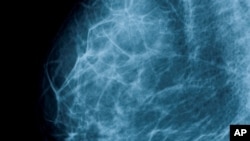A new study on the effectiveness of X-ray mammography to screen for breast cancer in women found that mammograms resulted in only a slight, 10-percent decrease in deaths from the disease.
The study involved just over 40,000 Norwegian women, between the ages of 50 and 69, who were part of a breast cancer screening program. In addition to their participation in a breast cancer management program, women underwent screening mammography every two years, between 1996 and 2005.
Their outcomes were compared to women in other countries who were also part of a breast cancer education and management program but did not have mammograms. Researchers found that the group that underwent mammography only had a 10 percent reduced risk of death from breast cancer compared to the women who weren't X-rayed.
Marvin Zelen is with Harvard University School of Public Health in Boston and a co-author of the study:
"Our findings are controversial because most physicians and investigators have felt that the reduction in breast cancer mortality rate would be much larger," said Marvin Zelen. "And we were surprised ourselves."
Zelen says it's unclear why mammograms were not more effective in reducing the death rate from breast cancer over the 10-year period.
"But of course there were advances made in treatment over this period of time which may have been responsible for a reduction in breast cancer mortality, as well as perhaps the population is more sensitized to any anomalies occurring in the breast," he said.
The findings are likely to add fuel to a fire that began last year, when an independent study group in the United States, called the U.S. Preventive Services Task Force, recommended against routine mammograms for women beginning at age 40.
Instead, the panel recommended routine screening should begin at age 50, when women are at a significantly higher risk of developing the disease.
The panel's critics argued that encouraging women under 50 to skip routine mammograms could result in many more undetected cases of breast cancer and more unnecessary deaths from the disease.
Zelen acknowledges the Norwegian study might now raise questions in the United States about the benefits of screening for breast cancer in women in their fifties.
But he says the study was not intended solely to evaluate the benefits of mammography alone.
"We're evaluating this program to reduce the mortality in Norway," said Zelen. "So, if a lot of women didn't participant in the program, it would not be a very good program, even though the diagnostic mortality would be very good. In this situation, about 77 percent of women who were given an invitation did participate in the program."
An article on the effectiveness of mammograms in preventing breast cancer deaths in Norway is published in the New England Journal of Medicine.
Study Finds Minimal Benefit With Breast Cancer Screening




